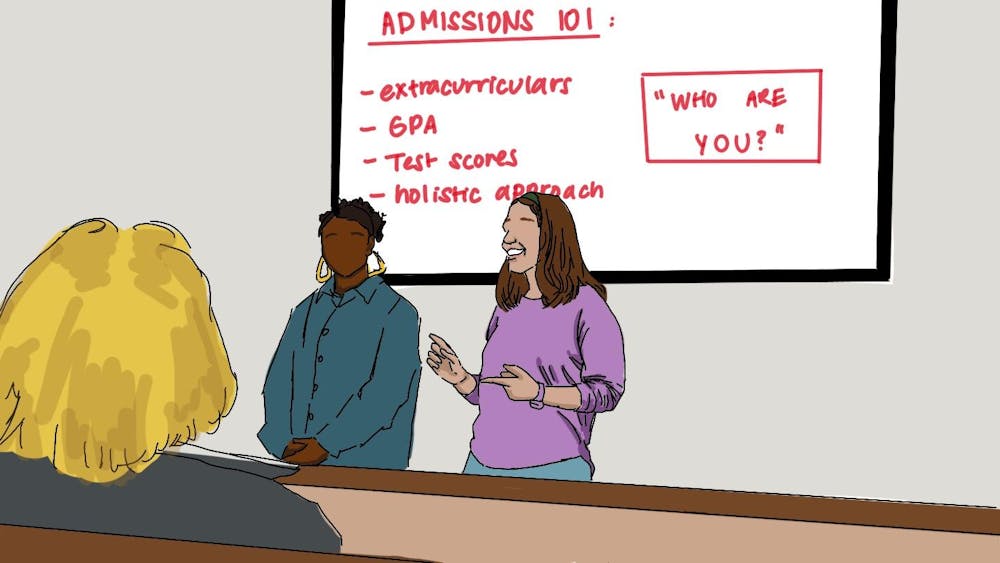President Christina Paxson P’19 P’MD’20 vowed in March to seek public input from Brown community members on the use of familial preferences in admissions. Eight months later, she has only solicited input via the Brown Alumni Magazine, which is distributed to alumni, staff, faculty and parents of current students.
The University currently has no plans to seek additional community feedback, University Spokesperson Brian Clark wrote in an email to The Herald.
Clark noted that when the University has additional information on its plans to investigate the question of legacy admissions, it will share “those details with the full campus community.” But Clark wrote that “at this moment, we do not have a specific timeline to share.”
The University has not prioritized asking for input on legacy admissions, Clark added, pointing to recent controversies on Brown’s campus and “world and national events” that have demanded “resources and attention.”
The University recently decided not to divest from companies affiliated with the Israeli military, leading to protests that resulted in the temporary suspension of Brown’s chapter of Students for Justice in Palestine. Paxson also announced last month that Brown would not dissociate from fossil fuels at this time, though the University plans to seek further faculty input.
“A number of matters of intense community interest have demanded attention this year, and we are focusing on supporting our community in relation to these pressing matters,” Clark wrote.
Clark did not address why Paxson only solicited input on legacy admissions in the Brown Alumni Magazine and not through other means.
Legacy admission is a contentious issue on campus, with 58% of students opposed to the practice, The Herald previously reported. Students who have benefitted from legacy admissions are more likely to support the continuation of the policy.
Students for Educational Equity, a Brown-based student organization that opposes legacy admissions, plans to reintroduce a bill in the Rhode Island State House that would outlaw the use of legacy preferences in college admissions.
In her letter, Paxson wrote that roughly 8% are legacy students. Legacy preferences are only given to students if one or more of their parents received an undergraduate degree at Brown. Applicants whose parents are University faculty members or staff may also benefit from family connections in the admissions process.
The Ad Hoc Committee on Admissions Policies — the advisory board that recommended familial preferences remain in place — said that legacy students “tend to be exceptionally well-qualified, with academic records that are stronger than that of average matriculants.” They also tend to come from higher-income households with access to additional support throughout the application process.
Those with family connections are more likely to enroll at Brown when accepted. Legacy admissions, the committee said, also creates “a sense of community and loyalty among Brown graduates.”
If such preferences were to be removed, the percentage of first-generation and low-income students at Brown would likely increase, the committee added. In an interview with The Herald, Paxson said that if the University was “concerned primarily with socioeconomic diversity, it would make sense to eliminate this practice.”
The committee also expressed concern for eliminating such preferences “when the applicant pool is beginning to reflect the more diverse population of Brown alumni” after decades of race-based affirmative action policies. Maintaining legacy preferences could help diversify future matriculating classes, as the children of diverse alumni would be encouraged to apply to the University.
Herald polling has found that white students are more likely to identify as legacies.
The first class of students that matriculated to the University following the Supreme Court’s decision to overturn race-based affirmative action saw a 40% decrease in the share of Black students compared to the previous class, The Herald previously reported. They also saw a 29% drop in Hispanic students.

Owen Dahlkamp is the managing editor of newsroom on The Herald's 135th Editorial Board, overseeing the paper's news operations. Hailing from San Diego, CA, he is concentrating in Political Science and Cognitive Neuroscience with an interest in data analytics. In his free time, you can find him making spreadsheets at Coffee Exchange.

Kate Butts is a senior staff writer covering University Hall. Outside of The Herald, she loves running, board games and Trader Joe's snacks.





